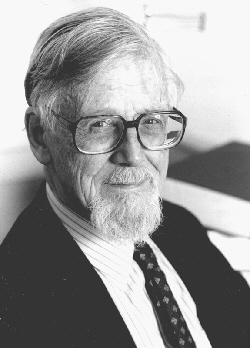
Photo courtesy Johns Hopkins University
J. G. A. Pocock, pathbreaking historian of ideas, passed away at age 99 on December 12, 2023. He was a leading scholar of 17th- and 18th-century Britain; of Italian, British, and Atlantic traditions of “civic republicanism;” and of multiple dimensions of the British and European Enlightenments.
From his first book, The Ancient Constitution and the Feudal Law: A Study of English Historical Thought in the Seventeenth Century (Cambridge Univ. Press, 1957), through the monumental The Machiavellian Moment: Florentine Political Thought and the Atlantic Republican Tradition (Princeton Univ. Press, 1975), to the deeply contextual six-volume study of the Enlightenment historian Edward Gibbon, Barbarism and Religion (Cambridge Univ. Press, 1999–2015), and beyond, Pocock’s many books and articles helped to create and define the methodology and exemplify the very finest work in the history of political thought. His pioneering methodology, associated with the contextualism of the Cambridge School (notably Quentin Skinner), emphasized particularly the study of historical thinking and thereby of political thinking. His works were read by many political scientists and moral philosophers as well as by historians and were translated into multiple languages. Many decades after first publication, his books remain in print and still are considered by many to be the best works on their subjects.
Pocock’s works combined brilliance, erudition, and astonishing chronological and conceptual range. He illuminated the significance of languages of political and historical thinking, such as those concerning immemorial custom, common law precedent, and multigenerational reason, as providing protection for a history of liberties against tyranny and absolutism in 17th-century England and then undergirding much of the argument for both the American Revolution and the moderate Whiggish conservatism of an Edmund Burke in the late 18th century. He identified the crucial importance of a language of virtue, independence, and civic participation as necessary to ward off corruption and decay in a republic, which he traced from Renaissance Italy—and, even before that, back to classical Greece and Rome—through to its transmission and transmutations in the English Commonwealth and neo-Harringtonian traditions of the 17th-century English revolutions, and then on to the American Revolution in the late 18th century. Pocock permanently changed and enriched our understandings of the varieties of Whig traditions of political liberty and the evolving world of 18th-century commerce. His studies emphasized the importance of the histories of property, law, Indigenous rights, sovereignty, manners, customs, religion, superstition, and the European Enlightenments. He argued for an interpretation of the American Revolution that stressed the signal contribution of “civic republicanism.” His work has inspired generations of scholars working on liberty, law, republicanism, and the history of history.
An Officer of the New Zealand Order of Merit, Pocock grew up in New Zealand as the son of a classics professor and a history teacher before undertaking his PhD at Cambridge University. He spent his first years in the United States at Washington University in St. Louis and then, from 1974 until his retirement in 1994, as Harry C. Black Professor of History at Johns Hopkins University. He received many scholarly accolades, including from the British Academy, American Academy of Arts and Sciences, American Philosophical Association, American Political Science Association, Royal Historical Society, and American Historical Association, and he served as president of the American Society for Eighteenth-Century Studies.
He took enormous pleasure and pride not only in scholarly recognition and influence but also in his family, as a husband to Felicity, father to Hugh and Stephen, and a grandfather. A lover of words in many forms, he took joy in the worlds created by J.R.R. Tolkien; often quoted from memory the works of Lewis Carroll, Hilaire Belloc, and Edward Lear; and delighted in Patrick O’Brian’s novels. He was an inspiring and an enormously kind and supportive intellectual mentor to his many graduate students, and an imposing but gentle and often whimsical colleague. He was generous in supporting many whose work he found interesting, composing longhand letters offering younger scholars and eminent colleagues alike suggestions and sustenance. One of the greatest historians of his generation or any generation, and a profoundly important scholar in terms of his own work, his influence on others, and his contributions methodologically, he is described fondly as a “gentle giant” by colleagues across the world who say that “we will never see his like again.”
John Marshall
Johns Hopkins University
Tags: In Memoriam Europe Legal History Political History

This work is licensed under a Creative Commons Attribution-NonCommercial-NoDerivatives 4.0 International License. Attribution must provide author name, article title, Perspectives on History, date of publication, and a link to this page. This license applies only to the article, not to text or images used here by permission.
The American Historical Association welcomes comments in the discussion area below, at AHA Communities, and in letters to the editor. Please read our commenting and letters policy before submitting.
Comment
Please read our commenting and letters policy before submitting.






